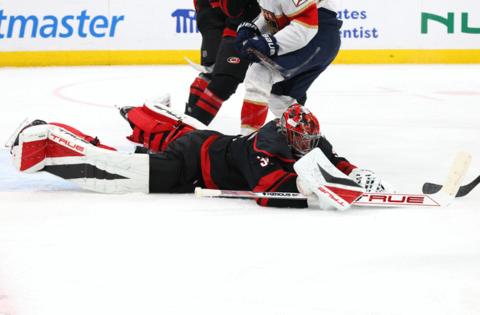Luke DeCock: In Game 2, Hurricanes have to prove Panthers haven't unlocked their penalty-kill
Published in Hockey
RALEIGH, N.C. — Sam Bennett made it look easy, which is typically the one thing that’s least likely to happen when the Carolina Hurricanes are killing a penalty.
He circled around from the right side of the ice to the blue line, had plenty of time and space to shoot and rifled a shot through traffic in front of the net to, essentially, secure Game 1 for the Florida Panthers by extending their lead to three goals early in the third period.
The Panthers scored as many power-play goals against the NHL’s best regular-season and postseason penalty-kill in Tuesday night’s 5-2 win as the Hurricanes had allowed in the 10 playoff games previous. And it’s not the first time they’ve done that, either.
They have scored at least one power-play goal in four straight playoff games against the Hurricanes dating back to the 2023 conference finals and are 6 for 18 over those five games. Which raises an uncomfortable question going into Game 2 on Thursday: Have the Panthers figured the Hurricanes out with the man advantage?
This is a matter of grave concern, because their ability to kill penalties is every bit a part of the way they wear teams down as their propensity for shooting a ton of rubber at opposing goalies. Lose that, and they lose a big piece of what makes them them.
Since the start of the 2023 season, the Panthers are converting at a dramatically higher rate against the Hurricanes in the postseason (33.3%) than everyone else in the postseason (13.1%), than everyone else in the regular season (15.2%) and even the Panthers themselves in the regular season (13.8%), although they did score three power-play goals in one of the three meetings this season.
Given the small number of games — five vs. Florida in the playoffs, compared to 278 otherwise over that span — this may very well be a statistical anomaly that isn’t replicable over the long term. But this isn’t the long term. This is a best-of-seven series, just as 2023 was, and giving up two power-play goals per game is no way to go through life.
The Panthers, on Tuesday, had six scoring chances on three power plays, per Natural Stat Trick. That’s almost twice as many per five-on-four situation as the Hurricanes allowed in the first two rounds, 35 on 29 times short-handed. (The Capitals also had one five-on-three power play, on which they scored.)
“We’ve got to be smart out there and not take penalties that need to be taken and give them power-play opportunities that don’t need to be had,” Hurricanes defenseman Jaccob Slavin said. “We’re all over it on the penalty-kill. We’ll stay with it and keep doing what we’ve been doing. Our structure’s fine. ... Just some missed assignments, some miscommunications out there. We haven’t had a lot of those in the playoffs, or even all season. And then just, we’ve got to block shots, too. It’s all part of it.”
Let’s leave the Xs and Os to the experts, because every playoff series is a battle of advantages and adjustments, game to game, period to period. What works in the first period of Game 1 may be fully neutralized by the second period of Game 2. That’s what video and practices are for.
Nevertheless, there are still elements of this fully within the Hurricanes’ control. They can take fewer penalties, for one. Three isn’t a lot, but all three Tuesday were eminently avoidable: Sebastian Aho’s retaliation that led to the first Florida goal, soft as it was; Andrei Svechnikov’s offensive-zone high-stick; Scott Morrow’s puck-over-glass penalty that led to Bennett’s goal. The gap between those infractions and hooking a guy down to deny a scoring chance is massive, and not just mentally.
“A couple penalties you don’t want to take,” Hurricanes coach Rod Brind’Amour said. “They made us pay.”
They can block more shots, although the three they blocked Tuesday wasn’t out of line with their numbers from the first two series. They can address some of the basic errors that allowed Carter Verhaeghe what felt like hours to flip a backhand over Frederik Andersen, or Bennett the room to pick a shooting lane, aim and fire. And they can perhaps get Jalen Chatfield back into the mix, after the defenseman missed the past two games with an undisclosed injury.
“A lot of it is execution,” Hurricanes forward Seth Jarvis said. “That first one I came down a little too low and put (Sean Walker) in a tough position. They have a good power play and it’s bound to go in eventually. But there’s some stuff we can clean up. We have a lot of confidence in the penalty-kill.”
Chatfield skated Tuesday and Wednesday and Brind’Amour labeled him as “day to day,” but he is an invaluable component of the Hurricanes’ penalty-kill as half of the two primary defensive pairs tasked with short-handed duty. As much as Alexander Nikishin and Scott Morrow struggled at even strength in his stead, neither can kill penalties, either. That puts more pressure on usual fifth option Walker — who was on the ice in Chatfield’s place alongside Dmitry Orlov for both Florida power-play goals — to fill the gap.
But this isn’t about one player, or even one opponent. Just as your best players have to be your best players — absolutely, absolutely — your strengths have to be strengths. The Hurricanes just aren’t the same team if they’re this easy to beat on the power play, no matter who they’re playing.
____
©2025 The News & Observer. Visit at newsobserver.com. Distributed at Tribune Content Agency, LLC.







Comments